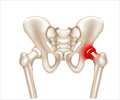Ibandronate Medication Information
Learn everything you need to know about Ibandronate-pronunciation, uses, dosage guidelines, indications, and when to take or avoid it.
Get up-to-date information on side effects, precautions, warnings, and proper storage to ensure safe usage.
Explore Ibandronate brand names commonly used in India and internationally, along with detailed pricing information. Consult your healthcare provider for tailored medical advice.
Generic Name : Ibandronate Pronunciation : i ban' droh nate ICD Code : Y57.9 Therapeutic Classification : Bone EnhancersBrand Names or Trade Names of Ibandronate
India :
International :
Boniva
Why is Ibandronate Prescribed? (Indications)
This medication is a potent bisphosphonate, used in the prevention and treatment of osteoporosis in postmenopausal women. It increases bone mineral density and prevents the breakdown of bones.When should Ibandronate not be taken? (Contraindications)
Contraindicated to known hypersensitivity, patients with esophagus abnormalities, inability to stand or sit and decreased calcium level in blood.What is the dosage of Ibandronate?
PO: The recommended dose is 2.5 mg once daily or 150 mg once monthly, before food.How should Ibandronate be taken?
It comes as a tablet to take by mouth, without food.What are the warnings and precautions for Ibandronate?
• Caution should be exercised in patients with history of allergy, taking any oral medications, undergoing radiation therapy, anemia, gastrointestinal problems including esophageal ulcer, cancer, infectious diseases, blood clotting problem, liver or kidney disease, during pregnancy and breastfeeding.• It may cause pain in muscle and joints, if it so, consult with your doctor.
• Avoid alcohol consumption while taking this medication.
What are the side effects of Ibandronate?
Most Common- Back pain, pain in the arms or legs, abdominal pain and diarrhea.Body as a Whole - Infection, weakness and allergic reaction.
Gastrointestinal- Indigestion, tooth disorder, vomiting and stomach inflammation.
Metabolic- Increased cholesterol level in blood.
Musculoskeletal - Muscle pain and joint disorder.
Central Nervous System- Headache, dizziness, numbness, sleep disorder, fainting and nerve root lesion.
Skin - Rash.
Respiratory - Chest pain, upper respiratory infection, inflammation of bronchus and pneumonia.
Eye- Eye inflammation.
Genitourinary- Urinary tract infection.







